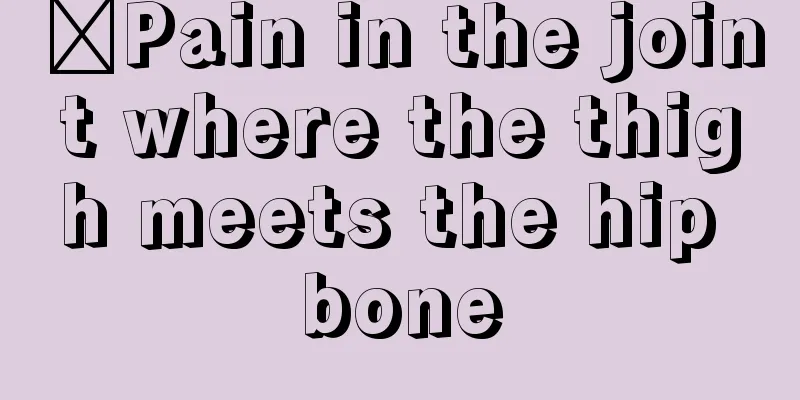Pain in the joint where the thigh meets the hip bone

|
Pain in the joint where the thigh meets the hip bone is also called hip pain. Hip pain is a very common phenomenon. If such a situation occurs, you need to compare your own situation and analyze the reasons for it. For example, for people who exercise regularly, joint pain at the thigh joint and hip bone is likely caused by muscle and tendon strain during daily exercise. Other causes are detailed below. In fact, what people commonly call "hip pain" or "thigh pain" is medically called "hip joint pain", which manifests as pain and discomfort in the hip joint or around the joint. However, please note that hip pain does not necessarily mean femoral head necrosis! What causes hip pain? There are many causes of hip pain, the following are the most common: 1. Muscle and tendon strain: usually caused by a history of acute trauma or strenuous exercise. Local exudation leads to swelling, tenderness, and ecchymosis. The diagnosis can be confirmed by B-ultrasound or MRI. 2. Hip osteoarthritis: common in middle-aged and elderly people, caused by degenerative changes in hyaline cartilage, chondromalacia, etc., often affecting both sides. The clinical manifestations are joint pain and inflexibility. The main causes are aging, long-term unreasonable posture and exercise, trauma and drugs. 3. Developmental dysplasia of the hip: This disease is a congenital developmental disease and is common in women. It often affects both sides. 4. Ankylosing spondylitis involving the hip joint: common in adolescent males, mostly involving bilateral sacroiliac joints, and HLA-B27 is mostly positive. 5. Rheumatoid arthritis: more common in middle-aged and elderly women, affecting both sides. 6. Temporary osteoporosis: It can be seen in young and middle-aged people, often occurring on one side, with temporary pain in the hip joint without obvious cause. 7. Lumbar disc herniation: It is more common in people who engage in long-term heavy physical activities. Lumbar disc herniation compresses the spinal nerve roots, causing pain in the waist, buttocks, hip joints and other parts. 8. Avascular necrosis of the femoral head: Any factor that affects the local blood supply to the femoral head, such as femoral neck fracture, long-term use of glucocorticoids, alcoholism, etc., causes bone cell death, which in turn leads to structural changes in the femoral head, causing femoral head collapse and dysfunction. This disease is called avascular necrosis of the femoral head. The main symptoms are hip pain mainly in the groin, buttocks and thigh areas, and limited internal rotation of the hip joint. 9. Bone or soft tissue tumors. |
<<: Common sense on what to do if your knee ligament is torn
>>: The folds of finger joints are white
Recommend
What to do when hair is falling out due to stress, how to adjust your mentality
Because many people face a lot of pressure from w...
How to remove moles the simple way
Although moles can appear on any part of the body...
What are the early symptoms of lung cancer? Detailed description of 4 early symptoms of lung cancer
Although lung cancer is a disease that people oft...
What are the symptoms of mid- to late-stage esophageal cancer
More than 90% of patients with mid- to late-stage...
Can I have a second surgery if pancreatic cancer recurs?
Can I have a second surgery if pancreatic cancer ...
Could pain in the liver area be caused by liver cancer?
The incidence of liver cancer is actually still v...
What kind of tea is suitable for a wood-fired kettle
The wood-fired teapot is fired with firewood. Aft...
Breast milk storage bag
Breast milk storage bags are tools used to store ...
What to do if you have a short forehead
Nowadays, more and more people pay more attention...
Experts will give you a detailed introduction to the advanced symptoms of bladder cancer
Bladder cancer is a common malignant tumor in the...
How to relieve mild concussion
A head hit often leads to a concussion. If it is ...
How to effectively prevent liver cancer? To prevent liver cancer, you should pay attention to four details in life
In modern life, there are more and more liver can...
What material is good for pacifier
For babies, pacifiers can divert their attention ...
Abducens neuritis
Many people are not particularly familiar with ab...
7 signs of fatty liver disease!
Modern people have various diseases of affluence,...









